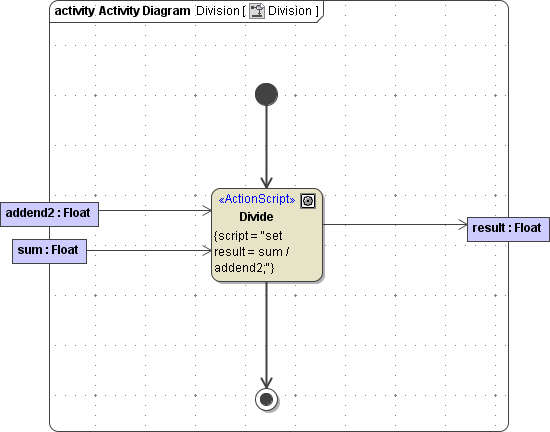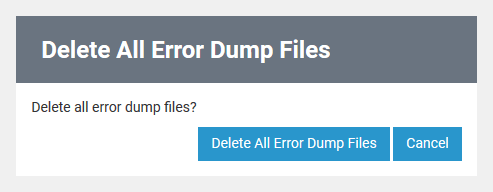- Created by Kirstin Seidel-Gebert, last modified by Annegret Bernhardt on Jan 26, 2024
Error dumps are written, when the service throws an exception that is not caught. Each single error is dumped into a separate file. On tab Dump, the Bridge displays a list of all accumulated error dump files, latest first.
By setting flag Dump Context on Error in the preferences section of the xUML Service tab, you can define whether error dumps are written at all. See Preferences of an xUML Service for more information on how to set this flag.
No error dump files will be created if
- the xUML service is running with Trace disabled (see xUML service preferences on the xUML Service tab)
- you are tracing the service synchronously or asynchronously with the Analyzer, no error dump files will be created. In this case, all tracing information will be picked up by the Analyzer (see Missing Tracing Information).

Click on a filename in the list to view the content.
To delete an error dump file, click the corresponding Delete button. The file will be deleted without any further confirmation.
To clean up all error dump files, click Delete all Files.
| A confirmation dialog is displayed. The action needs to be confirmed or canceled. |
To download an error dump file, click the corresponding Download button. Once downloaded, an error dump file can be imported into the Analyzer or Builder for further analysis of the error.
You can load the dump file into the Builder to do more investigation on the error. The Builder will show the erroneous action node in the xUML model, so you can investigate the error on the spot.
Refer to the Builder User Guide for more information on this.
Interpreting the XML of an xUML Service Dump
The following example shows the error dump created due to a division by zero. The error will occur in action node Division of activity diagram Division.

The error dump file will look like:
<?xml version="1.0" encoding="utf-8"?>
<DebuggerMessage xmlns:xsd="http://www.w3.org/2001/XMLSchema"
xmlns:xsi="http://www.w3.org/2001/XMLSchema-instance"
xmlns:SOAP-ENC="http://schemas.xmlsoap.org/soap/encoding/">
<Session>
<TransactionID>00000005618d676b0000144c000019b8105bfc03</TransactionID>
<SessionID>5</SessionID>
</Session>
<Exception>
<category>Internal</category>
<domain>FUASM</domain>
<code>3</code>
<description>Division by zero</description>
</Exception>
<Activity
name="Division..._145497611|_16_6_2_56aa07e1_1285058950975_758301_10717"
node="Divide..._145497611|_16_6_2_56aa07e1_1285059038644_247558_10789"
statementIndex="1">
<Context>
<addend2 xsi:type="xsd:float">0</addend2>
<sum xsi:type="xsd:float">10</sum>
</Context>
</Activity>
<CallStack>
<Call
name="urn:Services.Calculation.Ports.CalculationPortType.calculate"
id="_145497611|IMPL_OF_OP_P_FE_urn:templateNS.NameOfPort1::TemplateRequest"/>
<Call
name="calling"
id="calling..._145497611|_17_0_56aa07e1_1401794980541_538932_14267"/>
<Call
name="Division..._145497611|_16_6_2_56aa07e1_1285058950975_758301_10717"
id="_145497611|_16_6_2_56aa07e1_1285058950975_758301_10717"/>
<Call
name="Divide"
id="Divide..._145497611|_16_6_2_56aa07e1_1285059038644_247558_10789" statementIndex="1"/>
</CallStack>
</DebuggerMessage>
|
|
You can load the dump file into the Builder to do more investigation on the error. The Builder will show the erroneous action node in the xUML model, so you can investigate the error on the spot.
Refer to the Builder User Guide for more information on this.
- No labels
